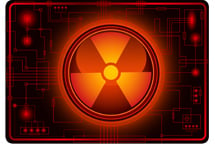No. You will not receive any ionizing radiation. In non-technical terms, ionizing radiation means radiation that is capable of altering chemical compounds. – In this case the chemicals that make up your body or DNA. Mostly we’re worried about radiation that could potentially alter our DNA If radiation cannot change DNA then there is no accepted scientific evidence that it can cause cancer. During a clinical MRI examination you will not receive radiation that is capable of damaging or altering the chemical structure of your DNA.
X-rays, on the other hand, are capable of damaging DNA. Fortunately, this is very rare. Moreover, a healthy cell can generally repair damage done by ionizing radiation without becoming cancerous. Interestingly, cancer cells, don’t repair damage from radiation well and tend to die -- this is how Radiation Therapy is successful in treating cancer!
Fortunately, this is very rare. Moreover, a healthy cell can generally repair damage done by ionizing radiation without becoming cancerous. Interestingly, cancer cells, don’t repair damage from radiation well and tend to die -- this is how Radiation Therapy is successful in treating cancer!
What is non-ionizing radiation, and is it used in an MRI?
We don’t often think about it, but the term radiation means any energy that is radiated or transmitted in the form or rays, waves, or particles. Ionizing radiation, capable of altering chemical compounds by breaking the bonds that hold the atoms together, is only a very small fraction of all the possible types of radiation. Most non-ionizing radiation is, well, heat! When you hold your hand a few inches above a candle flame your hand gets warmed by the radiation -- heat waves -- emitted from the flame. This type of radiation is called infrared radiation. Light is radiation. Radio waves are radiation. These are all types of electromagnetic radiation. (As it’s name suggests, electromagnetic radiation is either electrical or magnetic.)
We rely on electromagnetic energy in the process of MRI. Specifically, we use crafty combinations of magnetic fields and radio waves. But the types and frequencies are, by their nature and strength, non-ionizing, and there is no evidence to suggest that having an MRI can lead to cancer.
But can the types of non-ionizing radiation we use in MRI have other undesirable effects?
Even though the candle does not emit ionizing radiation if your hand is given an overdose of infrared radiation (heat) you’ll get a burn! The amount of energy used in an MRI scan is pretty impressive, but it’s very, very carefully controlled. Nonetheless, and in very rare cases, we can run into situations where the energy is concentrated in an unexpected and undesirable way, usually by certain types of metal. This is why patients are asked numerous times, and in different ways, whether they have any metal in their bodies. Under certain conditions this could result in heating of the metal and a burn in the surrounding tissue. That’s why so many of us in this field are so careful.
The primary concern is always patient safety!
Bottom line: MRI does not use ionizing radiation or any type of radiation that is linked with cancer. There is no evidence, or even suggestion, that having an MRI can increase your risk of getting cancer. It is very safe, and we do not know of any harm that comes from having an MRI.



